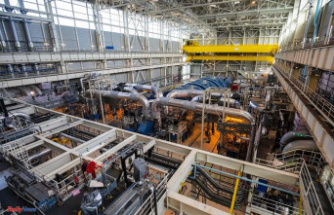The Ukraine war is also crowding out climate protection. Nevertheless, more is happening in the economy than we suspect - and a new generation of startups is dedicating itself to saving the climate, says book author and "Capital" editor-in-chief Horst von Buttlar.
ntv.de: In your new book you describe the decade up to 2030 as a "green decade". What do you mean by that?
Horst von Buttlar: The years up to 2030 are a key decade in the fight against climate change. By then we have to develop certain technologies, massively expand renewable energies - and achieve certain CO2 targets. There are years in which something has to happen - after that it would be too late. Most of the plans of states and companies therefore go until 2030.
And are we on the right track?
Let's disregard the war in Ukraine for a moment: Before that, we were further along than we often thought. Most of them think: nothing happens when it comes to climate protection. But in numerous companies, a lot has started to move in recent years. Climate protection is no longer a marginal issue, it becomes part of the strategy and is often controlled from the very top. That is also necessary, often it is a question of existence: In my opinion, a company without a sustainability strategy has no strategy at all. This conversion to climate neutrality is like a new operating system for the economy, a new green revolution.
Do you have an example?
Let's take BASF. The CEO, Martin Brudermüller, has been driving the topic of climate protection through the company for several years. He calls it a "humanity task". At first, he told me, a lot of people thought: is he crazy? One percent of German emissions are generated at the Ludwigshafen site alone. BASF wants to become climate-neutral by 2050, and emissions are to be reduced by 25 percent by 2030. A tour de force! The chemical group wants to invest one billion euros by 2025, and another two to three billion euros by 2030. BASF needs vast amounts of energy for the chemical processes - for this purpose it is building its own wind farms together with RWE, for example.
So companies organize their own green electricity?
Yes, such cross-industry alliances are another pattern in the "green decade". Many corporations join forces because otherwise they would not be able to do it alone. The good thing is that we won't need any magic bullets by 2030. We have most of the technologies, solar energy, wind power, insulating materials, charging stations, energy storage. We just have to spend a lot of money to ramp everything up to convert our homes, heating systems, power plants and factories at record speed.
You mentioned BASF as a positive example. But isn't that the exception rather than the rule?
No, there are similarly ambitious initiatives at other chemical companies or in the steel industry. Above all, globally active and publicly listed corporations must report their CO2 strategies and targets. Otherwise investors will be stressed. Money just adjusts... There are still big gaps here too, but the data situation is getting better. Think of it like a map of the new world - which gets more detailed every year.
Where are the major levers for the climate-neutral conversion?
Not always there, what we discuss. Most of the emissions come from the generation of energy. Then come the emissions from industry. And there it is above all the classic heavy industry: steel, chemicals and the cement industry. The steel companies alone account for around eight percent of German emissions - all the blast furnaces have to be converted and run on hydrogen instead of coal in the future. That costs many billions and requires a lot of renewable energy. In theory, Thyssenkrupp alone would need over 3,000 of its own wind turbines. The technology is available, but has not yet been tested on an industrial scale.
In your book you speak of a "new founding era". What do you mean by that?
A new generation of entrepreneurs are dedicating their work to the fight against climate change. And it's crazy all the ideas and startups that are being created there! They are also getting more and more money from investors. According to a study by Roland Berger, the global market for green technologies was 4.6 trillion euros in 2020 - and the market is growing. Climate tech startups raised $32 billion worldwide in the first nine months of 2021. And the fastest growing region was Europe.
But do these startups really want to save the world? You probably just want to make money.
Of course, they also have to make money. But many of the founders I spoke to for the book are already on missions. They are researching new types of energy storage systems, systems to filter CO₂ from the air, they breed meat in the laboratory, are experimenting with new building materials - or at innovative charging stations. Just as Biontech found a corona vaccine with the "Lightspeed" project, we now need thousands of small Biontechs. Because by 2050, half of the CO₂ reduction must come from technologies that are not yet ready for the market but will have to be by 2030.
What technology are you referring to, for example?
Let's take the process of scrubbing CO₂ out of the air, called "Direct Air Capture". Many startups are researching this, one of the most important players comes from Switzerland and was founded by two Germans: Climeworks. You started with small systems in Switzerland in greenhouses - now there are larger systems in Iceland, where the CO₂ is pressed directly into the volcanic rock. The founder Jan Wurzbacher said to me: We have to learn, optimize, understand, as quickly as possible - because today they only get a few thousand tons out of the air, in 2030 millions of tons - and after 2050 it has to be billions of tons of CO₂ per year. And by then the costs have to come down.
Can this country really become climate-neutral through innovations alone? Shouldn't we also do without the familiar in order to conserve resources?
Renunciation is an emotional issue - but it will not work without renunciation and other behaviors. In the scenarios of the International Energy Agency, for example, there is a global speed limit of 100 m/h! It is often said that Germany alone cannot save the world - that's true, 195 countries signed the Paris Agreement. It's just that not all countries will follow the same path at the same pace. Countries like India get more time because they have to lift millions of people out of poverty first. In the best case, however, these countries then use technologies that are ready for the market here - just as Africa has skipped the fixed network directly to mobile communications.
What was the trigger for your book for you?
In the summer of 2021, I read a study by the International Energy Agency that electrified me: it ran through everything we have to do by 2050. One example stuck with me: There is a mega solar park in India with 2.25 gigawatts on 5700 hectares. In purely mathematical terms, said the energy experts, mankind would have to set up such a wind farm every day if we wanted to limit the temperature to well below two degrees. A mega solar park every day!
And do we achieve all these goals?
These numbers are really staggering. On many days I was discouraged during the research - on top of that there was the war, which accelerated many things, but also pushed climate protection back again. Climate protection relies on a world that cooperates - there can be no talk of that at the moment. But I've often met people with such energy, drive and innovative spirit that I thought: Yes, our problems are huge. But so does man's ability to solve them.
Jan ganger spoke to Horst von Buttlar












